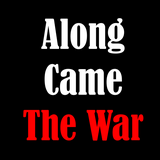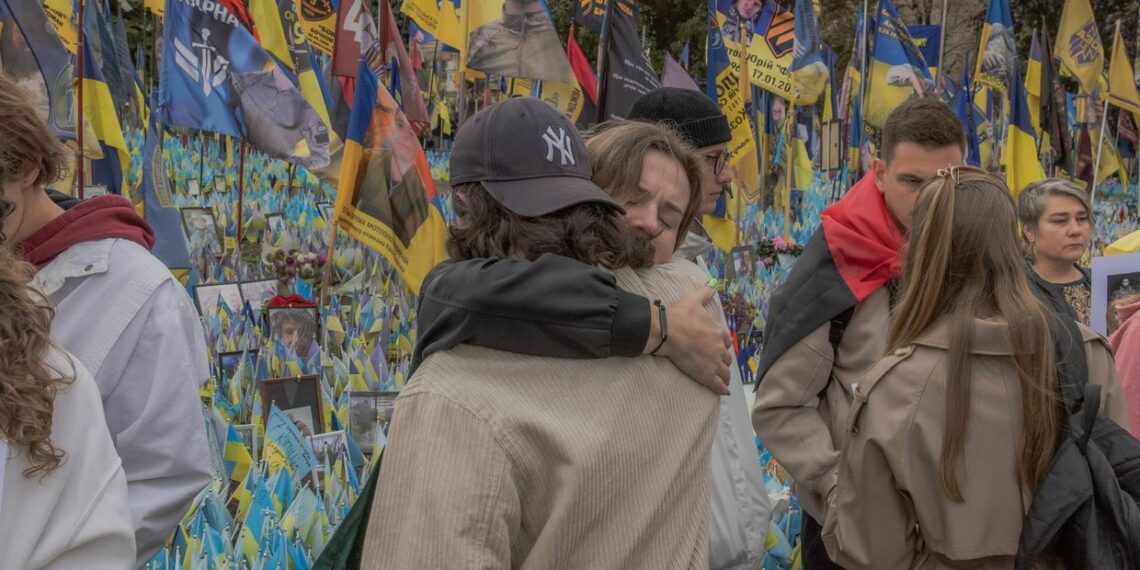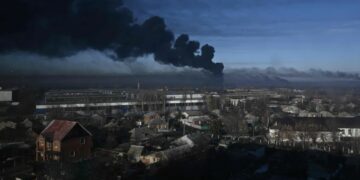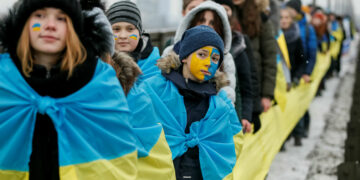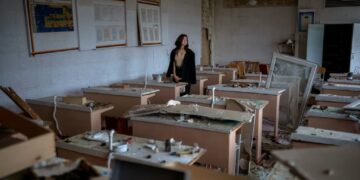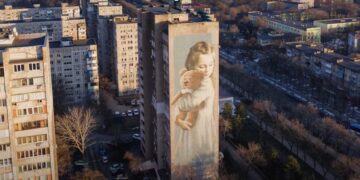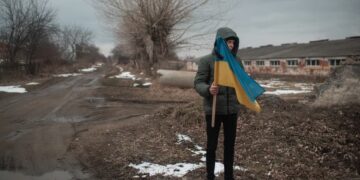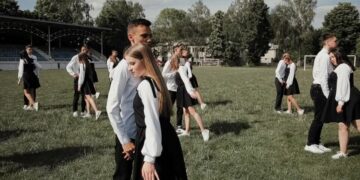The full-scale invasion of Ukraine by Russian invaders began on February 24, 2022, following nearly eight years of active hostilities waged by Putin in the Donbas region with the help of mercenaries and Russian army soldiers. Three long years have passed since that fateful moment when our world changed — the beginning of a full-scale war that redefined our lives, our communities, and our understanding of what it means to be human in times of conflict. In this collection, we have gathered the voices of our students — voices that captured the turbulence, hope, and resilience that emerged in those early days. Their texts serve not only as historical evidence but also as reflections on the profound personal and collective transformations brought about by the outbreak of war.
Three years ago, on the 24th of February, the war came to our home. Russia invaded and began to hit us with missiles. What do we feel today and how we survived, what we remember and how our perception of war has changed, all these questions we discuss today. These are texts which were written by students of Kyiv Mohyla Academy who were 15-year-old teenagers, now they think and try to express themselves to share their experience in an attempt to understand what is happening.
Maria Fito:
Unquestionably, 24 of February 2022 was one of the most terrible days in the lives of all Ukrainians, but everyone has their own experience with it. The person who told me about the full-scale invasion was my mother. She was completely shocked and scared, despite the fact that we live in Lviv. I don’t remember my first thoughts and emotions, but I was calm because I had to support my mother and younger sister. Lately, I was feeling some sort of anger at my parents because our family wasn’t ready for this, even though my father had warned us about war because he is a soldier and apparently he had information about it. Of course, I started being really worried about my father because I didn’t know where he was and what was going on with him. I wasn’t worried about my family, but I was worried about my friends from Kyiv Oblast and Mariupol. I even had а call with them and they were calm enough to make me believe in it. (I guess it happened because they didn’t realize scale of the war, so almost everyone did) I clearly remember how that calm and belief that everything will be over transformed into agony and fear really soon. Also, I remember how horrible were my feelings when my friends were under occupation and I could do nothing to help, sitting in my relatively safe city. Speaking about the changing of perception of war, nowadays, after 3 years of full invasion, I don’t feel this fear for my family and feeling like everything is ruined in one moment. It may sound weird, but everything seems more stable because risks and dangers are adequately assessed. However we all have an understanding of what to do when missiles or shacheds are flying, which we didn’t have then. To be honest, now more than ever, I understand characters from Remarque’s works, who go to drink coffee with friends or other events during the war in order not to go crazy after returning from the front line.
Sofia Holovko:
I remember not feeling much on the morning of February 24th. It was something like an absolute internal emptiness followed by a series of mechanical rational actions. The start of the full-scale invasion was nothing unexpected, as well as the awareness about an immediate mobilisation of my father. My main thought was that this is the only scenario things could possibly develop – and that hasn’t changed.
What changed – or at list is in a very slow process of transforming – is the sense of value. For the first two weeks, I haven’t cried once: I was the eldest in the house, taking care of my sister and cousins while my parents were dealing with business and army processes. And then one evening something broke through inside me. I remember myself crying wildly to my mother that I want to be there, on the frontline, fighting; otherwise, I am senseless. Sometimes I still feel this way, losing the value of my realisation in art, literature and so, but what makes a difference now is that I am taking concrete steps towards my involvement in war. And for the first time, I feel like I actually can stay whole, not choosing between my personalities.
Maryna Andrushko:
Starting in November 2021, everyone was talking about “alarm” suitcases and a full-scale Russian invasion of Ukraine. Everyone was expecting something, but until February twenty-second, I did not sow panic, but a conversation with my parents and a realistic assessment of the situation made me understand that war was inevitable.
02/24/2022 morning, I wake up at about 6 am, because my dad got a phone call, and he said “What started?”, immediately the news, experiencing “what next?”.
At that moment, I could not think about anything or anyone except my dad.
From the first minute of the slightest awareness of what was happening, I tried to support my mother, my younger brother. You read the news, you try to critically analyse and distinguish between fake and true information.
We stayed in our hometown, didn`t leave, during the occupation of Energodar, and accordingly the Zaporizhzhia Nuclear Power Plant, I believed and now tried to believe in the best.
However, on July 27, 2022, the first shelling of my city of Marganets took place, since then the fire has not subsided for a day.
Today I feel even greater anxiety for my family, friends, country, about myself. However, I believe that Ukraine will withstand and win this bloody war.
Daria Yakovleva:
On the night of February 23, 2022, the news reported that Russian troops were gathering on the border. There were warnings of a full-scale war, but the idea seemed too surreal to accept. Preparing for graduation was a priority, and it was hard to believe that life could change overnight.
By the morning of February 24, everything had changed. A call at sunrise informed us that the invasion had begun. The reality of war was far removed from previous experience – volunteering for soldiers, organizing charity fairs, and helping displaced children had never conveyed the weight of real combat. In Khmelnytskyi, a quiet western city, the sight of tanks and the sound of explosions were unthinkable. The outside world remained unchanged: sunlight streamed through the windows, familiar streets looked the same, but nothing felt normal. Fear took over, but it was difficult to overcome.
Turning to the family for answers, the atmosphere at home was tense. The TV was broadcasting dark news, and the phones buzzed with messages confirming the worst predictions. The school was cancelled indefinitely. The next steps were uncertain, but the most necessities had to be provided. The lines at pharmacies and ATMs were long, filled with neighbours and familiar faces, each reacting differently – some in shock, others trying to return to normal. Since the Internet was down, there was no way to check on close friends or those in more vulnerable regions. The only certainty was the need to stay active, to do something.
By the middle of the morning, a sense of purpose was formed. The experience of volunteering at festivals and shelters suddenly found a new use—helping in refugee centres. Friends unspoken agreed that staying useful was the best way to fight fear. The first serious challenge came when the news spread that pets could not be taken to shelters. The realization that our beloved animals could be left behind was unbearable. A local coffee shop suddenly started collecting donations. People gathered and donated money for the most necessary things. Then, we went to the youth centre, where volunteers worked tirelessly, moving bags and boxes of food, medicine, and other essentials. The centre was bustling with energy, and folk songs filled the air, creating a sense of unity. Carrying the loads was easy, as adrenaline and determination replaced exhaustion.
It was time to go to the grandparents’ house in the evening. The whole family, including the young cousin and the faithful dog, gathered in the basement, which had been turned into a shelter. The night ended with quiet singing to calm the child, although the numbers and statistics of the victims were still on his mind. The fear of maths was once associated with failing exams, but now it was about counting the lives lost. When I fell asleep, I couldn’t stop wondering why this happened.
Oleksandra Sulim:
I woke up when my mom came into my room and said quietly but seriously:
— The war has started.
I didn’t fully understand her words. I was still sleepy, so I just turned to the other side and tried to go back to sleep. But I couldn’t. Something inside me felt wrong. I picked up my phone, opened YouTube, and turned on the news. What I saw didn’t feel real. Explosions in Kyiv, Kharkiv, Chernihiv… Chernihiv. That was my city. That was my home.
We started packing our most important things. There were tears, panic, and fear. We decided to leave for the region, thinking it would be safer there. Later, we realized it was the wrong decision because we ended up living under occupation. We also left our parrot at home, believing we would return in three days. But we didn’t.
A week later, my dad walked back to the city on foot to take care of the parrot. Luckily, it was fine. Our village was occupied, but not as badly as other places. It was surrounded by rivers on three sides, so the Russians didn’t enter—it was simply inconvenient for them. I spent a month there, feeling stuck, scared, and lost.
Later, my siblings and I managed to escape. We travelled through lakes and trying to find a safe way out. Only a month later, we finally returned home. But home didn’t feel like home any more. It felt empty. Different. As if the war had taken something from it—and from me.
Valeria Zalizniak:
24 February 2022 will be remembered as one of the worst days of my life. My feelings and thoughts are hard to describe on that day. When I woke up I heard the first explosions and did not understand what had happened. My brain refused to accept that it was shelling and that a full-scale invasion had begun. Even when I turned on the news, I did not understand the criticality of the situation and could not even answer a seemingly simple question: ‘Do you realise that war has started?’.
It’s quite strange to talk about this, because for more than month before that, everyone had been talking about it and I had knew for a long time that a full-scale invasion could begin, but when faced with this situation, I intuitively tried to reject the news. I was very scared that day and thought a lot about what might happen to my family. However, my main concern then was the fate of Ukraine.
Now, in the third year of the full-scale invasion, my thoughts on the war in Ukraine have changed. At the beginning of the full-scale invasion my mind was ruled by fear and I could not consciously assess the situation. Now all my thoughts are about how I, at the age of eighteen, can help the country survive this difficult battle. My heart hurts when I think about the bad outcome of this war, so I want to do everything possible to ensure that the actions of those who gave their lives for Ukraine’s independence were not in vain.
Sofia Ivanova:
That was a day that changed everything.
It was 4 AM, and I was asleep. My mother’s voice woke me up—she was talking on the phone. As I listened, I realized she was speaking to my father. Their conversation was intense, filled with urgency and concern. Snippets of their dialogue reached me: “We need to leave,” “Pack our things,” “We’re staying for now.” I didn’t understand what was happening, but a deep unease settled over me. Then my mother turned to me and said, “Wake up. The war has started.” A chill ran down my spine, but I still couldn’t grasp the reality of it. War? What war? What’s happening? My mind struggled to process the words.
Before that day, I had not followed the news. In school, teachers had asked us if we had prepared emergency bags, if we believed an invasion was coming. I never took it seriously. I lived in a bubble of ignorance. War had always seemed like something distant, something that belonged to history books—World War I, World War II—events that felt so far removed from my life that they might as well have been fiction. I had heard the warnings, but I never truly comprehended the scale of what was about to happen.
That morning, I was still in a state of disbelief. The first thing I did was go to the kitchen to make tea and ask my classmates, “We’re still going to school, right?” My mother told me that there had already been several explosions before I woke up. I had slept so deeply that I hadn’t heard a thing. A few hours later, around 10 AM, the first air raid siren sounded. That was when fear truly hit me. Panic took over—I started packing a backpack, but I had no idea what to take. I rushed to the hallway, unsure of what to do. At that time, there was no clear information about where the missiles were heading. All we knew was that an air raid alert had been issued.
I don’t remember if it was that day or a few days later, but at some point, the fear and stress overwhelmed me, and I broke down crying. After that, I seemed to adjust—I still felt anxious, but the panic wasn’t as intense. My hands still trembled during explosions, though. That evening, I went to the store. I was terrified that the siren would go off while I was outside, so I rushed to buy everything as quickly as possible. I was lucky—I made it back before the next alert.
Of course, school was canceled. Online attendance wasn’t strictly required, but those who could still joined. Throughout the day, I stayed in contact with my friends. Looking back at our messages now, it’s shocking and almost amusing that we somehow managed to joke during those first terrifying days. We slept fully dressed, ready to run to the hallway at any moment.
That day was just the beginning. None of us knew how much our lives were about to change, how long the fear would last, or how deeply it would shape us. But in that moment, all we could do was wait and hope for the best.
Yelisaveta Shramko:
The first days of the full-scale invasion for me were like getting into an alternate reality. Everything had changed, and I could only go with the flow. The funniest thing was that I had known this would happen in advance. Unlike many people in my hometown, I realized that the full-blown war was just around a corner. One of the most horrifying feelings was knowing that and being unable to persuade people to believe in it, too. And then, it was too late.
Because of this initial knowledge, the first days seemed not as terrible for me as for some other people. Reflecting on them, I even feel nostalgic. Of course, this is just a psychological trick of my mind, and I was lucky to meet the full-scale invasion in a small town that wasn’t opposed to any direct threat. But I do miss the feeling of unity and, most importantly, hope. And I miss that version of myself, which was eager to fight and believe in something good.
Three years of war have exhausted many of us. The most painful for me was disappointment in the world around us. The hope and resolution that filled me at the beginning of the full-scale war had faded into apathy. Now I feel like the world is trying to get rid of us, and we are powerless to stop that. People have shown their true faces during this war, and they appeared uglier than I thought. I loathe what’s happening in Ukrainian society right now, too. Everything feels like a massive downfall, a betrayal of what we were fighting for three years ago.
Reflecting back on the beginning, I ask myself: could everything be different? And would it be possible to rekindle that romantic optimism of the first days that, despite all the horrors, moved us forward? I sincerely wish for this to happen.
Anna Haidai:
I didn’t believe until the last moment that a war could happen in the 21st century. When my dad started bringing home porridge, canned food, heaters, and mattresses, I laughed and thought he was crazy. The war started right after my birthday party. Now I understand why I couldn’t believe it was possible. I was preparing to celebrate, not to hear explosions.
When Russia began its full-scale invasion, my parents were anxious about my mental health. At that time, I was receiving treatment with a psychotherapist, having a pronounced manic-depressive disorder. There were two options: either to pull myself together and cheer everyone up or to stick to my bed, not being able to get up. The second option happened to me. I was very exhausted, weak, constantly crying, and sleeping in the basement most of the time. Exactly a week later, my parents decided that it would be better for me to go to Germany with my aunt.
What has changed since the war started? I lived for almost half a year in a foreign country, speaking a foreign language, and being far away from my dearest people — my parents. I woke up every morning being afraid that I would never see them again. I learned to take responsibility for myself. This is the biggest change that happened to me. I also realized that I love my homeland so much that I am ready to live in Ukraine even under shelling and air raid alarms.
After six months, I returned home without my aunt. I came back as an adult, with a clear civic position and endless gratitude to life that my parents were alive, and I could see them again.
Alina Hostar:
Me, a Russian-speaking girl from Chernihiv that used to dream about applying to The Karpenko’s university in Kyiv and 24.02.2022. First siren, first shock wave. But it wasn’t the shock wave from the war, no, because we knew that one day or another the war in the south of Ukraine would come to us all. It was the first explosion in Kyiv that happened to be near my aunt’s house. The cruelty of bombing paralyzed me for a second, but then panic quickly appeared. First instinct shut me – run. I packed all documents, medical stuff and food to run into the basement as fast as possible. However, my mum was very calm and nearly unbothered. It seemed like she had predicted everything and was ready for that day any time soon. We went to our underground car park and found all our neighbours together. We didn’t know what happened after because we didn’t have wifi or any connection underground. Furthermore, we knew only two things: 1)we might lose our homes or die in the near future and 2)we hate those f***ing animals that call themselves humans.
Now, I’m Ukrainian-speaking girl that loves and embraces her ethnicity and culture. A girl that applied to Kyiv-Mohyla academy and is now learning her lovely Ukrainian language as a professional. The only things that haven’t changed since then: 1)I might lose my home or die in the near future and 2)I hate those f***ing hypocrites that call themselves human after all this genocide they have done.
People still dying just because they are Ukrainian, just because Russians are xenophobes and murderers. Please, don’t forget..
Victoria Velychko:
It is worth starting with the fact that my perception has changed not only because of the terrible events of the war, but also because I have become older and gained more experience.
I was very afraid that the war would break out, and for some reason, I was immediately convinced that it would. Before I woke up at 5:00 in the morning, I had a dream in which russian war started, and I was riding alongside the railroad where rockets were flying and destroying the airfield, and this vision was completely true.
The first thoughts that came to my mind were the terrible explosions from the missiles: “We’re definitely going to die.” ”Is life really over so quickly?” “I’m so young, maybe it’s a lie?”. I was also very alarmed: “Oh, my God, it’s our father in Kyiv, the world must be ending there.”
I realized that I never thought russia was so close because I always thought it was somewhere very far away.
My mom was very surprised and scared, saying that if they came here, we would give them everything we have, just so they wouldn’t touch us. I immediately remembered how at school we had a completely different attitude, which was aimed at fighting and patriotism. Later, we started to do something, collecting bottles for Molotov cocktails, helping each other somehow, and with difficulty I came to the realization: “Even if I die, I will die a free Ukrainian, and muscovites will remain slaves” – this helped me breathe freely, live and not be afraid of death. Then I prepared myself for the fight and did everything I could to at least learn about my country. With knowledge of the history, culture, and art of Ukraine, my faith grew tremendously, and then I realized that I wanted to study Ukrainian philology and entered the Kyiv-Mohyla Academy.
Now and always, I will believe in Ukrainians, truly, faithfully, sincerely and strongly. My heart is forever with my country, and I can’t think of anything more precious than the feeling of being in Ukraine, even though our country is not perfect, but at least you know what to expect from people. But it really breaks my heart that the government is lying for the sake of money, they are making money from the war; one thing is on TV or in an Instagram post, and in life it is completely different. We will never win without a conscious government. I am sad that the deputies are still so hungry for money and will not get enough while children are left without parents and women without husbands. However, I am forever grateful to our military for keeping me alive. I don’t know any people stronger than the Ukrainian military. I am grateful to God that I am a Ukrainian and I will die as one.
Anastasia Chepelieva
24 of February 2022 didn’t mean to be special for me — just a usual school day. I woke up early because of undone assignments for my classes. It was approximately 5 a.m. I became embarrassed when I connected my phone to the Internet and it started yelling because of a surge of messages. I opened the news and my face distorted: it was within “bombs, explosions, russian troops invaded Ukraine, people are running away from Kyiv” and so on. Within 5 minutes I heard that my mum was talking on the phone with someone. It was my sister who lives with her family in Kyiv. We were extremely disturbed about them. Therefore, we were in great need of finding a way to transfer them to us (we live in Zhytomyr oblast). Talking about my feelings, it’s a confusing topic. Our mental system usually works as well as to reduce stress and if it happens, it’s a common coping mechanism to “block” our emotions and feelings to accumulate forces to be able to deal with real problems. So, it was the emotional way I faced the full-scale war.
The war has been lasting for 3 years in Ukraine. Throughout this period many things have changed as well as attitudes toward them. To be frank, at first, I got my head in the clouds. I was sure that russians would protest against putin and war. So that this war would stop as soon as possible. However, now we know that they are deaf. About my perception, I can state that my attitude about war and my understanding of its mechanisms have changed. Many Ukrainians became aware of what it means – to live in a country with war. You cannot be uninvolved in these processes. To overcome difficulties, we need to stay together, stay with our army, and do whatever we can. Therefore, I assume that this is the main idea that I reconsidered – you are part of this nation and society, now we are fighting against russians and we need to stay together, to see the main enemy and defeat it.
Sofia Samborska:
Early in the morning of 24.02.22 my mother woke me up to tell me that russia and belorus were bombing the borders of Ukraine. That day I couldn’t even imagine what those borders looked like and where they were. I could not even name and point properly every region of my country on the map. I was communicating with my friends and family in russian. I wasn’t aware of our country’s political and cultural state. It all changed vividly that same day. Air alarm’s map taught me regions and borders. I haven’t used russian language ever since, and I am trying to keep up to date with Ukrainian news and be an active part of my country’s civilians. I am trying not to forget and forgive everything that russians did to my people. If you put it lightly, this war made me the person I am now. I can’t even imagine who I would be, if not for this terrible invasion.
Back then, this war felt like an anomaly, something that couldn’t have happened in the 21st century. However, now from the perspective of three years, I feel that it is reality. It is the only life I could have. I want to live this life in a balance of what I want to do and what I have to do.
Liubov Nurmakhamedova:
I think that for many, February 24, 2022 became the zero point, the moment from which everyone begins their personal countdown. Mine started in Kyiv. That Thursday in February I was supposed to have a physics test, but instead, at 6 a.m., to the sounds of explosions outside the window, I quickly put the last thing in my backpack – a black dress with white polka dots. It seemed to me that among all this set of completely practical things: a prayer book, warm clothes, a power bank, a first aid kit, matches, food that does not spoil for years, there should be at least something that will remind me of my former self. I thought that if I had to fit my entire life into one backpack, then let this dress be in there as well.
I remember being calmly that morning. I just took one last look at my room, trying to remember every detail, then threw my backpack over my shoulder and left.
Looking back, that dress was a symbol of trying to preserve the meaning of life, when the familiar and established past has already been lost, and the future is so fragile and uncertain.
That dress in my backpack was more than just fabric. It was a quiet act of defiance, a way of refusing to let war erase my identity. And each of us carries something like that, whether it’s a physical object, a memory, or an unshaken belief in the future.
Sofia Shelest:
It was early morning, my deep sleep turned into drowse because lights in my flat were turned on, and my mum was anxiously searching for something in my wardrobe. I tried to pretend like everything was okay, cause somehow expected that she would tell me thing I had been afraid for the past few months. Honestly, it’s terrifying to see that even adults are in a panic and don’t know what to do.
24 of February is total emptiness which I felt. Previous life was ruined in one moment, new life so unpredictable, scary, and you don’t know if there will be any. But what I get for 3 years of full-scale war is that you adapt, for example, sleep in shelter during the russian missile attack, and a few hours later after drink coffee, work, study just because of the randomness you weren’t killed. We live in a permanent pain of losing people, their dreams plans and achievements, and with it, you can’t cope, it deeply hurts.
The war made me rethink all my values, become less naive. Eventually, I’m disillusioned with humankind and have faith in them(us) at the same time.
Sofia Chornopolska:
On February 24, 2022, I was abroad with my family. I was sleeping, worrying about the physics test that was supposed to take place the next day. Then my father walked into the room. I woke up and asked what hour it was. He said it was five a.m. I said, “Good Lord. There’s some time until the bloody physics test.” He said that the war started and that Kyiv was being bombed.
To say I was shocked is to say nothing. I quickly checked my phone. There were tons of messages from my friends. One of them, Lev, told me, “Your parents were so right about going abroad.” Days before, we had a conversation about how much I wanted to come back as soon as possible. I started a hunger strike for my parents to promise that I would go home after just two weeks.
Then we started having non-stop chats with my classmates. Everyone was cheering the others up, sharing important information, announcing their plans and whereabouts. Some of them got into occupation and got out while russians were shooting civilian cars. They were traumatized by seeing other people die. At the start of March, our English teacher was taken hostage in Hostomel.
Me and my sister took part in every pro-Ukraine activity we could think of, we were spreading information and donating to the army.
The main feelings at the time were shock, terror, wrath, and unity. And also guilt – I developed a form of survival guilt syndrome.
The world stood with Ukraine. All these Red Viburnum records, blue and yellow flags around, “Slava Ukraini” mottos, brought by smiling strangers. I felt as much gratitude as despair. I tried to look for as much goodness as possible.
The war made me rethink what humankind was. I couldn’t wrap my head around such terrifying cruelty that was happening all around. I wanted to understand people. Thus, I developed an interest in war history, cultures, and languages.
As time passed by, everything got calmer, and it was terrifying. Frozen war seemed too hopeless to grasp. The West cared less and less. My friends and acquaintances were dying at the frontlines.
I was growing older without knowing what it was to be young. Just like in Jacques Brel’s song, «Il nous fallait bien du talent pour être vieux sans être adultes».
Eventually, I came back to Ukraine. And I’m so glad to be here. No matter what happens next, I want to be a part of it. And I really hope that the world will support our cause. It’s not just about an unlucky far-away country; it’s about whether the international law has any meaning at all.
Veronyka Martynova:
Since the start of the full-scale invasion, my perception of the war that began in 2014 has changed—not immediately, but gradually. I experienced it up close and felt its impact personally. At first, it deepened my sense of belonging; later, it sharpened my awareness of my own role. I think, the general maturation that took place during these years played a role here: I expanded my knowledge, became more conscious, and realized that I can also influence something, maybe in very small ways, but I am still a participant.
I remember how the events of the Revolution of Dignity seemed to me. My parents strictly forbade me to even approach the Independence Square, arguing that it was necessary to ensure my safety. And in general, this topic was hardly ever raised in my family. Nevertheless, I cannot say that these events passed me by completely. There were many situations that shaped my perception of the events at the time. What struck me the most then, and still does now, is the unquestionable unity, or even rallying itself as a process. As a child, I saw a news story about the Maidan library that was set up in the Ukrainian House. It was a small thing that stuck in my memory — a plastic bowl into which library users had to put a piece of paper with the inscription «чесне слово» (honest word) and a personal signature as a purely moral guarantee that the borrowed books would be returned. That was probably when the seed of my desire to join this togetherness, to connect with these people—both spiritually and in reality—was planted.
By now I feel that I have finally achieved this. On the morning of February 24, 2022, I woke up to my mother’s frightened movements and learned that the full-scale invasion had begun. In that moment, I was certain the war would take me away. But now, I’m doing something to hold on longer and to contribute, however small my impact may be. The most profound change within me over these years has been the shift from “somewhere else and not about me” to “here, now, and all of us together.”
